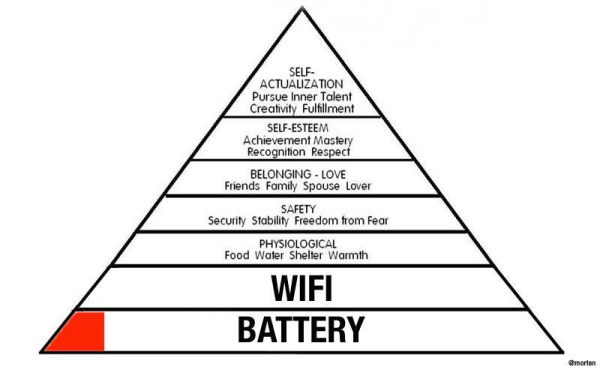As I write this, Texas has already cleared up and is warm again ... but the effects of a week spent below freezing (with temperatures reaching below zero) will be felt for a long time.
 via Joe Raedle/Getty Images
via Joe Raedle/Getty Images
Even though it had not snowed here in for several days, the Rolling Blackouts continued through the end of the week. It is hard to believe Texas does not know how to handle six inches of snow. Having grown up near Boston, I recognize that with no plows, no sanding, and no salt ... you stand little chance of keeping the roads clear. At some level, it is just idiots slipping, sliding, and waiting for the sun to come out. But who would have thought that would describe top leaders of the State and its ability to provide basic human needs like power, water, and heating (let alone WiFi and battery power)?

The ice storm and cold snap weren’t so bad for me (compared to some of the stories I’m hearing from other people in our office). Yes, we lost power, water, and the Internet ... but only for a few isolated hours. I was lucky (and so was our data center), but millions (including several Capitalogix employees) suffered due to lack of water, electricity, or heat, and to add insult to injury – burst pipes.
Despite the fact that the temperature is back in the high 50s, here is a photo I took at our local supermarket this weekend. Let's say things aren't quite back to normal yet.

I've seen a lot of political mudslinging from both sides trying to avoid blame. The reality is that this mess is a disaster that doesn't need to be politicized (and should be used as the raw material to make sure that something like this doesn't happen again). While Texas rarely sees weather like this, this wasn't the first time we have, and it won't be the last.
Two major factors came into play.
First, Texas chose to stay off the national grid to avoid federal regulation. The Texas grid is called ERCOT, and it is run by an agency of the same name — the Electric Reliability Council of Texas. We joke about Texas seceding from the Union, but the reality is that many Texans are fiercely independent and crave less federal regulation (which is a discussion for another day) so the choice resonated with constituents. Especially since Texas is a very energy-rich state. Unfortunately, not being on the national grid means that when our grid is overtaxed, we're mostly on our own. In the winter of 2011, when our power sources couldn't keep up with needs we imported energy from Mexico to keep up, but this year much of Northern Mexico was struggling as well.
Second, Texas chose not to winterize its power sources. After 2011, a proposal was floated to winterize energy plants by adding insulation, heating pipes, etc. but it was very costly and wasn't adopted. Many Texans (including politicians) were quick to blame it on the underperformance of renewables, but in this case, according to ERCOT, natural gas, coal, and nuclear were affected.
All of these energy sources can be winterized, and renewables work fine even in Antarctica. This isn't an argument for renewables or for joining the national grid. Just an acknowledgment of the current situation.
ERCOT claimed that they were ready for the storm, and warned their plants to "winterize" how they could, but clearly, it wasn't enough. With more preparation locally and on the state level, Texans should be fine to handle these types of episodes in the future. With that said, it shouldn't take episodes like this to enact change.
Regardless, crises like this are opportunities to come together, and I've been very happy to see how many people have offered food, water, and their homes to people in need.
Thank you to all who reached out to check in on us.
The Power of Naming Things
I remember when my son finally got smarter than our dog. For the record, it took longer than I thought it would.
With respect to human intelligence, language is likely the first domino. It allows "chunking" and makes learning new things more efficient, effective, and certain.
Language is powerful in-and-of-itself. Using language consciously is a multiplier. Today, I want to focus on one such use of language – the power of naming things.
The Power Of Naming Things
Before I go into detail, I shot a video on the subject, with a few examples from our business.
Having a shared language allows you to communicate, coordinate and collaborate more efficiently. But it's hard to have a shared language when you're discussing something intangible.
That's where naming comes in. When you name something, you make the "invisible" visible (for you, your team, and anyone else who might care).
I've often said the first step is to bring order to chaos. Then, wisdom comes from finer distinctions. Naming is a great way to create a natural taxonomy that helps people understand where they are – and where they are going.
I like thinking of it in comparison to value ladders in marketing.
Each stage of the value ladder is meant to bring you to the next level. By the time someone gets to the top of the value ladder, they're your ideal customer. In other words, you create a natural pathway for a stranger (meaning someone who doesn't know you well) to follow, to gain value, trust, and momentum onwards ... ultimately, ascending to become someone who believes in, and supports, what you offer and who you are.
Ultimately, successful collaboration relies on common language. That is part of the reason naming is so important. The act of naming something makes it real, defines its boundaries and potentialities, and is often the first step towards understanding, adoption, and support.
Creating "Amplified Intelligence"
Here is an example from our business. When we first started building trading systems, all we had was an idea. Then we figured out an equation (and more of them). Next, we figured out some methods or techniques ... which became recipes for success. As we progressed, we figured out a growing collection of useful and reliable ways to test, validate, automate and execute the things we wanted to do (or to filter ... or prevent).
For someone who didn't understand the organizing principles, it probably seemed like a mess. Compounding the problem is that fear, uncertainty, and doubt are inhibitors to potential customers and stakeholders (like the employees working in a business).
Coming up with the right organizing principle (and name) makes it easier to understand, accept, and adopt. For example, many traders and trading firms want to amplify intelligence – meaning they were looking to make better decisions, take smarter actions, and ultimately to perform better (which might mean making and keeping more money). To help firms amplify intelligence, we created the Capitalogix Insight Engine (which is a platform of equations, algorithms, methods, testing tools, automations, and execution capabilities). Within that platform, we have functional components (or modules) that focus on ideas like portfolio construction, sensible diversification, alpha generation, risk management, and allocation strategies. Some of those words may not mean much to you, if you're not a trader, but if you are it creates an order that makes sense and a path from the beginning to the end of the process.
It makes sense. It explains where we are – while informing what might come later.
The point is that naming things creates order, structure, and a contextual map of understanding.
It a compass heading that we can use to navigate and guide in uncertain territory.
Hope that helps.
Posted at 07:26 PM in Business, Current Affairs, Ideas, Market Commentary, Personal Development, Science, Trading, Trading Tools, Web/Tech | Permalink | Comments (0)
Reblog (0)